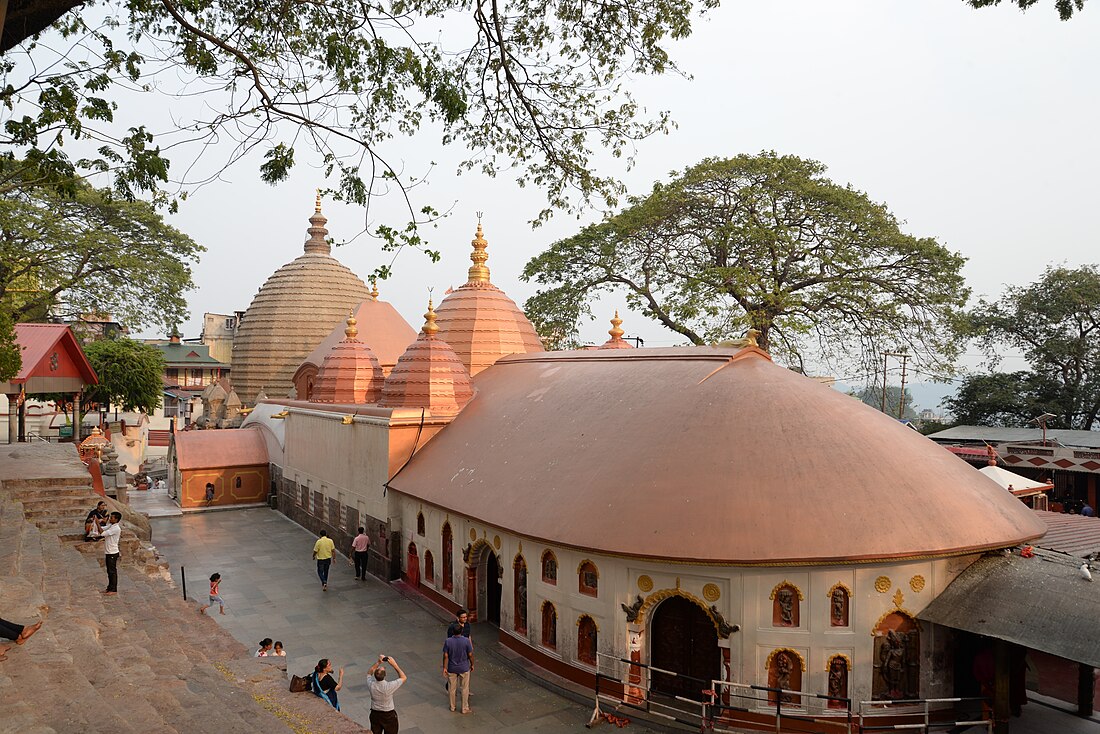Kamrup Metropolitan district
District of Assam in India From Wikipedia, the free encyclopedia
Kamrup Metropolitan district is one of the 35 districts in Assam state in north-eastern India. It was carved out of the erstwhile undivided Kamrup district in 2003 and covers an area equivalent to the area under the jurisdiction of the Guwahati Metropolitan Development Authority area. Dispur Legislative Assembly Constituency in Kamrup Metro district with 3.53 lakh voters is the largest constituency in Assam.[1]
Kamrup Metropolitan district | |
|---|---|
 Location in Assam | |
| Coordinates: 26°11′0″N 91°44′0″E | |
| Country | India |
| State | Assam |
| Division | Lower Assam |
| Headquarters | Guwahati |
| Government | |
| • Lok Sabha constituencies | Gauhati |
| • Vidhan Sabha constituencies | Jalukbari, Dispur, Gauhati East, Gauhati West |
| Area | |
• Total | 1,527.84 km2 (589.90 sq mi) |
| Population (2011) | |
• Total | 1,253,938 |
| • Density | 820/km2 (2,100/sq mi) |
| Time zone | UTC+05:30 (IST) |
| ISO 3166 code | IN-AS |
| Website | https://kamrupmetro.assam.gov.in/ |
History
It was created on 3 February 2003 by bifurcating the erstwhile Kamrup district.[2]
The Government of Assam, during the Chief-ministership of Tarun Gogoi, had proposed to bifurcate it further and create a new district, named East Kamrup. In 2016, the process of creation of the district was started.[3] But later that year, the process of creation was stopped midway due to lack of infrastructure.[4]
Geography
Administrative headquarters of Kamrup Metropolitan district is at Guwahati city.[5] The district occupies an area of 1527.84 km².
Climate
| Climate data for Guwahati | |||||||||||||
|---|---|---|---|---|---|---|---|---|---|---|---|---|---|
| Month | Jan | Feb | Mar | Apr | May | Jun | Jul | Aug | Sep | Oct | Nov | Dec | Year |
| Record high °C (°F) | 30 (86) |
33 (91) |
38 (100) |
40 (104) |
38 (100) |
40 (104) |
37 (99) |
37 (99) |
37 (99) |
35 (95) |
32 (90) |
28 (82) |
40 (104) |
| Mean daily maximum °C (°F) | 23 (73) |
25 (77) |
30 (86) |
31 (88) |
31 (88) |
31 (88) |
32 (90) |
32 (90) |
31 (88) |
30 (86) |
27 (81) |
24 (75) |
29 (84) |
| Mean daily minimum °C (°F) | 10 (50) |
12 (54) |
15 (59) |
20 (68) |
22 (72) |
25 (77) |
25 (77) |
25 (77) |
24 (75) |
21 (70) |
16 (61) |
11 (52) |
19 (66) |
| Record low °C (°F) | 5 (41) |
6 (43) |
6 (43) |
11 (52) |
16 (61) |
18 (64) |
20 (68) |
21 (70) |
20 (68) |
15 (59) |
10 (50) |
5 (41) |
5 (41) |
| Average precipitation mm (inches) | 11.4 (0.45) |
12.8 (0.50) |
57.7 (2.27) |
142.3 (5.60) |
248.0 (9.76) |
350.1 (13.78) |
353.6 (13.92) |
269.9 (10.63) |
166.2 (6.54) |
79.2 (3.12) |
19.4 (0.76) |
5.1 (0.20) |
1,717.7 (67.63) |
| Source: wunderground.com [6][failed verification] | |||||||||||||
Demographics
Summarize
Perspective
| Year | Pop. | ±% p.a. |
|---|---|---|
| 1901 | 52,351 | — |
| 1911 | 58,160 | +1.06% |
| 1921 | 62,264 | +0.68% |
| 1931 | 68,102 | +0.90% |
| 1941 | 81,183 | +1.77% |
| 1951 | 95,123 | +1.60% |
| 1961 | 216,357 | +8.56% |
| 1971 | 315,404 | +3.84% |
| 1991 | 771,477 | +4.57% |
| 2001 | 1,059,578 | +3.22% |
| 2011 | 1,253,938 | +1.70% |
| source:[7] | ||
Population
According to the 2011 census Kamrup Metropolitan district has a population of 1,253,938,[8] roughly equal to the nation of Estonia[9] or the US state of New Hampshire.[10]} This gives it a ranking of 384th in India (out of a total of 640).[8] The district has a population density of 2,010 inhabitants per square kilometre (5,200/sq mi). Its population growth rate over the decade 2001-2011 was 18.95%. Kamrup Metropolitan has a sex ratio of 922 females for every 1000 males, and a literacy rate of 88.66%. 82.70% of the population lives in urban areas. Scheduled Castes and Scheduled Tribes make up 8.12% and 5.99% of the population respectively.[8]
Religion
| Religion in Kamrup Metropolitan district (2011)[11] | ||||
|---|---|---|---|---|
| Religion | Percent | |||
| Hinduism | 84.89% | |||
| Islam | 12.05% | |||
| Christianity | 1.50% | |||
| Jainism | 0.74% | |||
| Other or not stated | 0.82% | |||
As of the 2011 census, 84.89% of the population are Hindus, Muslims are 12.05%, Christians are 1.50% and Jains are 0.74% of the population.[11]
Language
At the time of the 2011 census, 57.87% of the population spoke Assamese, 20.50% Bengali, 10.45% Hindi, 2.39% Nepali, 1.66% Boro and 1.55% Karbi as their first language.[12]
See also
References
External links
Wikiwand - on
Seamless Wikipedia browsing. On steroids.



